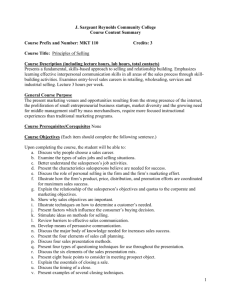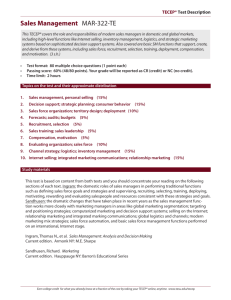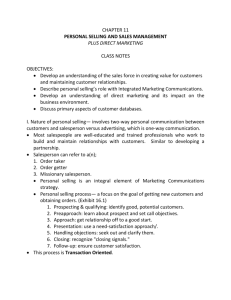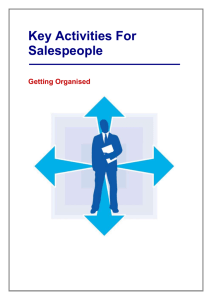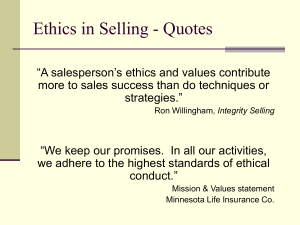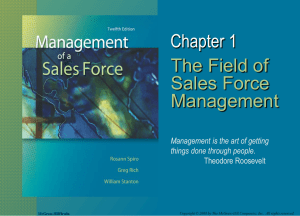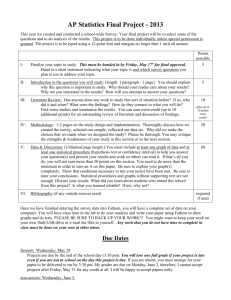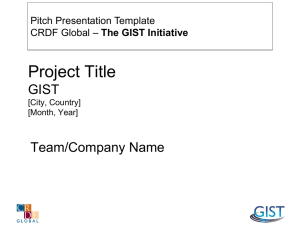Knowledge Need
advertisement
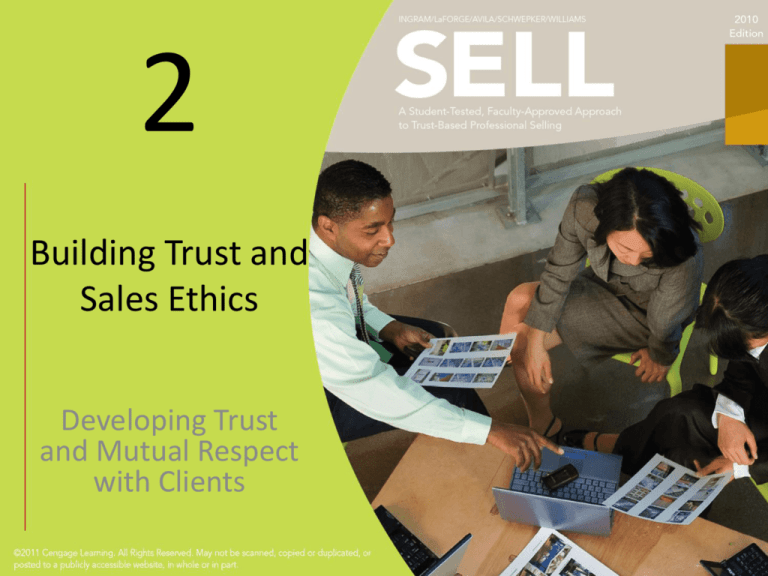
2 Building Trust and Sales Ethics Developing Trust and Mutual Respect with Clients Learning Objectives L 1 Explain what is trust. L 2 Explain why trust is important. L 3 Understand how to earn trust. Know how knowledge bases help L 4 build trust and relationships. Understand the importance of sales L 5 ethics. 2 What is Trust? The extent of the buyer’s confidence that he or she can rely on the salesperson’s integrity. 2 Why is Trust Important? A fundamental competitive strategy of a growing number of organizations is to build long-term mutually beneficial relationships with their customers. The ability of those organizations’ salespeople to earn their customers’ trust is essential to the success of that strategy. 2 How to Earn Trust 2 Dependability Customer Orientation Expertise Candor Trust Compatibility How to Earn Trust Expertise: The ability, knowledge, and resources to meet customer expectations. Expertise must translate into observable results and contribution for the buyer. 2 How to Earn Trust Dependability: Predictability of a person’s actions. Predictability: The extent to which a salesperson’s behavior that can be foretold on the basis of observation or experience by a buyer. The salesperson must also demonstrate an ability to handle confidential information. 2 How to Earn Trust Candor: Honesty of the spoken word. It means being upfront with others, especially with regard to issues/factors that may impact those others. It takes only one misleading event to lose all credibility. 2 How to Earn Trust Customer Orientation: The act of salespeople placing as much emphasis on the customer’s interests as their own. Salespeople with a customer orientation advise rather than “sell”. 2 Ethical Dilemma 2 How to Earn Trust Compatibility: A salesperson’s commonalities with other individuals. Customers generally like to deal with salespeople whom they can feel a bond. 2 Readiness to Earn Trust 2 Knowledge Bases Help Build Trust and Relationships Companies provide extensive training to prepare salespeople for the field. 2 Training 2 Industry Knowledge Knowledge Need: the dynamics, structure, culture, and forces that affect the industry or industries in which they work. Benefit: ability to 1) develop and execute effective selling strategies, and 2) be viewed as a market information resource. 2 Company Knowledge Knowledge Need: understand their company’s culture, mission, goals, policies, and procedures. Benefit: ability to effectively and accurately represent the company when interacting (e.g., negotiating) with its prospective and current customers. 2 Product Knowledge 2 Knowledge Need: a thorough understanding of their product offerings and the various sources of value they provide Benefit: be perceived (by the customer) as experts and capable of accurately matching solutions to the needs of the customer Service Knowledge Knowledge Need: understand their company’s service capabilities, including limitations, fees, time-frames, and the value they add Benefit: ability to match their company’s service capabilities to the needs of their customers 2 Service Knowledge Areas 2 Promotion and Price Knowledge Knowledge Need: understand the details of, and how to manage, promotional programs and the pricing policies of their products Benefit: ability to 1) facilitate their customers’ participation in promotional programs and 2) effectively negotiate terms 2 Market and Customer Knowledge Knowledge Needs: understand the markets they serve and their customers, including needs, personalities, and communication styles. Benefit: ability to 1) develop and implement effective selling strategies, and 2) clearly communicate relevant solutions. 2 Competitor Knowledge Knowledge Need: their competitors and respective market offers and how they are perceived in the market. Benefit: to position their products against those of their competitors’. 2 Technology Knowledge Knowledge Need: understand how utilize sales technology hardware and software (e.g., internet, CRM, laptops, smart phones) Benefit: to leverage technology to me more competitive . . . work smarter not harder 2 Technology in the Sales Effort 2 Ethics Clearly Right Ethical Dilemma Clearly Wrong Ethics refers to right and wrong conduct of individuals and institutions of which they are a part. 2 Unethical Behavior 2 Advice for Salespeople 2 NonCustomer-Oriented Behavior 2 Categories of Unethical Behavior 2 Role Play 2
